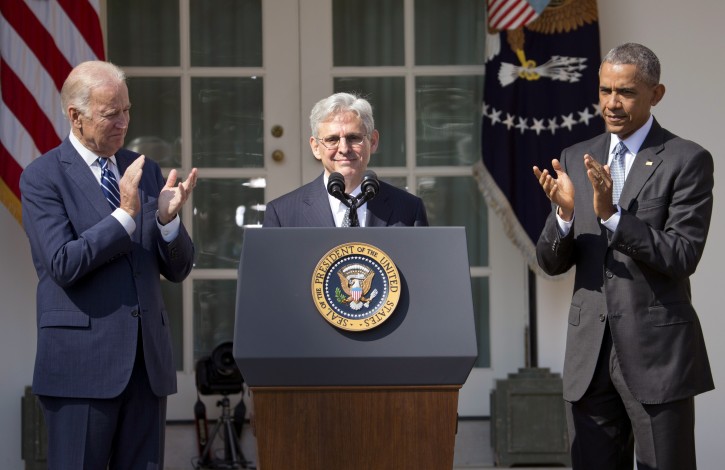
Washington – By nominating an uncontroversial 63-year-old judge, President Barack Obama handed Republicans an unwelcome election-year proposition: Give in or risk letting Hillary Clinton or Donald Trump pick a Supreme Court justice the GOP might like even less.
Obama’s selection of appellate judge Merrick Garland landed with a bang the morning after primaries in Florida, Ohio and other key states made clear that Clinton and Trump will be their parties’ presidential candidates, barring extraordinary circumstances. Obama described Garland as an evenhanded consensus-builder, all but daring Republicans to block him and face uncertain consequences from voters.
Republican leaders dug in on their insistence that the next president get to choose the replacement for the late Antonin Scalia, the influential conservative and high court’s most provocative member. Senate Majority Leader Mitch McConnell called it “an issue where we can’t agree.”
Yet there’s a glaring wildcard for Republicans: Obama’s successor could be a Democrat.
Republicans loathe Clinton, but they recognize that if she wins the presidency, she could nominate someone far more liberal than Garland, who’s regarded as a centrist. At the same time, the GOP establishment is extremely wary of the unpredictable Trump and desperate for an alternative.
A Democratic victory at the presidential level could be accompanied by a return of the Senate to Democratic control, further complicating Republicans’ ability to prevent Democrats from getting their way. Republicans are fighting their toughest Senate races this year in states like New Hampshire, Wisconsin and Illinois where Democrats are hoping independent-minded voters will be turned off by the GOP’s hardline position.
Not only do many Republicans fear a Trump nomination would spell electoral doom for the GOP up and down the ballot, many conservatives doubt Trump is really one of them. Trump’s suggestion Wednesday that he’s mainly taking policy advice from “myself” fueled further uncertainty about just what kind of justice he would pick.
It’s a theme Democrats are already seizing as they pressure Republicans to relent and use their opposition against them in the election.
Within minutes of Garland’s nomination, Senate Democratic leader Harry Reid accused Republicans of “blindly taking their marching orders” from Trump, an argument echoed by the Democratic Senatorial Campaign Committee.
Dan Pfeiffer, Obama’s former senior adviser, said the combination of Garland’s profile and a looming Trump nomination had cranked up pressure on Senate Republicans.
“The idea that they are blocking the president’s qualified pick in order to pave the way for Trump’s is going to be a very powerful argument that will be deployed endlessly” in states that Obama won, Pfeiffer said.
Clinton’s string of recent primary wins added another element of intrigue to the Supreme Court fight. If she’s elected and Democrats recapture the Senate, Republicans might see the writing on the wall and opt to confirm Garland during a lame-duck session before Clinton takes office.
“I think that’s self-evident,” said Arizona Sen. Jeff Flake, one of the only Republicans agreeing to even meet with Obama’s nominee. “Between him and somebody that a President Clinton might nominate, I think the choice is clear.”
Clinton, in her response to Obama’s nomination, praised Garland as a “brilliant legal mind” and urged senators to confirm him. Neither she nor her campaign would say whether, if she inherits the vacancy, she’d be inclined to re-nominate Garland or choose her own nominee.
No Republican has yet broken with McConnell by calling for Garland to get a vote, though Sen. Susan Collins, a Maine moderate, called for a hearing. A few Republicans facing tough races — including New Hampshire Sen. Kelly Ayotte — said they would meet with Garland, in what the White House saw as an early sign of hope.
At 63, Garland may also be an easier sell than had Obama chosen a younger candidate for the lifetime post. Two other federal judges that Obama seriously considered — Sri Srinivasan and Paul Watford — are both under 50.
Yet Obama’s safe-bet pick may have denied Democrats the chance to gin up excitement among liberals whose engagement is critical to Democratic electoral success. Liberal advocacy group CREDO lamented that Garland’s background “does not suggest he will be a progressive champion,” while Democracy for America called it a “deeply disappointing” nomination designed to “appease intransigent Republicans rather than inspire the grassroots.”
“Even if there are some critics on the left, those aren’t the people who are preventing Judge Garland from getting a hearing,” said Ron Klain, a former Obama aide and top White House lawyer under President Bill Clinton. “If this is not going to proceed, it’s not a problem of Democrats’ making.”
As reported by Vos Iz Neias
